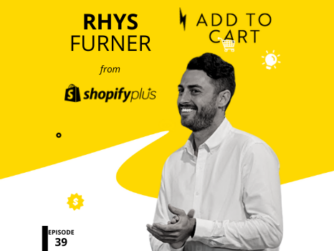In this episode of Add To Cart, we are joined by Dean Jones, co-founder and CEO of fashion rental business, GlamCorner. GlamCorner started in 2012 with Dean and his wife, Audrey. Neither had a fashion background but they did have a united vision to “accelerate the transition to a more circular and sustainable fashion system”. Today, they operate out of a 5,000 square metre fulfilment centre in Sydney, have 130 people on the team, 30,000 articles of clothing in rotation and rent out up to 70 tonnes of clothes each month. In this episode, we discuss how GlamCorner have mastered their quality control process to know exactly when a garment has reached the end of its lifecycle, how they’ve gone from building a Magento site in five weeks to a fully custom platform that powers their entire business and why Dean thinks that instant deliverability – led by drones – is the future differentiator in eCommerce.
“Our customer became so fanatical about using our offering, it wasn’t just another transactional relationship, we knew were were deeply changing her consumption behaviour.”
Dean Jones
Questions answered in this episode include…
- What’s been the most challenging element of scaling a rental business model?
- How did you go about modelling your unlimited price plan?
- What technology are you most excited about?
Fashion streaming
“GlamCorner is on a mission to accelerate the transition to a more circular and sustainable fashion system. My wife Audrey and I built this business, we founded it back in 2012 when we realized that the average Australian woman really only wears about one-third of what’s in her wardrobe. The other two-thirds we discovered was a stockpile of items that she had purchased for single occasions and events in her life, but then never wore it again.
Our hypothesis was, if we built the largest wardrobe in the country, could our customer come and just borrow from us whenever they liked and ideally pay a fraction the amount of money to remove that kind of burden of ownership that was being imposed on that customer?
Fast-forward nine years and we’ve got 130 people on the payroll. We rent out, even now, 50, 60, 70 tons of clothing a month and have hundreds of thousands of customers around the country that we’ve solved this problem for. As in, solved it for her in that she now outsources a large part of her wardrobe to us. Her wardrobe has shrunk because she now knows, “Actually, I can just keep that part of my wardrobe kind of in the cloud, and I can stream my wardrobe like I stream many other things in my life, music, Netflix.”
Unlimited offering
“In short, it’s incredibly difficult. Where would you price an unlimited offering? And it took some time early on to calibrate. The goal was we wanted to be as generous as possible, as long as it’s at a price point where we’re not taking a bath. We wanted to give the customer free rein to say, “Use this service to supplement things you would have otherwise just bought and kept in your wardrobe, to whatever extent you wish.”
What is interesting about that offering is there are some customers who like to hang onto that product for three months, there are some people who like to swap out those products three or four times a month. What we did find was interesting, and we had to test it to know, just because it is still a physical product. So even if you want to binge-watch it and get a box delivered, turn it around and send it back, you can only do that so many times a month.
But what we realized is we shouldn’t get too hung up on that because why would anybody bother doing that? Why would they get something delivered to them, not wear it, send it back just to annoy us? I think people have got better things to do with their time. And so we realized when we look at the data, no one does that. I think the shortest timeframe of a turnaround is probably a couple of days.
It was mainly because we had other customers who were renting product, trying it, and sending it back. For the same reason why big department stores have had customers wardrobing them for ages where they’d buy it, wear it over the weekend, and bring it back. We’ve always just asked ourselves, if that’s the customer behavior, why not just make that the product and just charge a fixed price for it?”
Fast tech to capture opportunity
Nathan: “In doing the research, I read from 2015 back when you were quoted around launching a new Magento platform in five weeks?”
Dean: “Yeah, wow. It’s an interesting example, because when we were going live for one of our large Fulfillment by GlamCorner partners, one of the requirements was, “Can you do it quickly?” We went away to the team and asked ourselves, and our team is just well-trained, well-drilled here, “What do you do in this sort of situation?” We came back and we said, “We can get you live within four or five weeks.” And as our business grew, our team is just familiar with that pace, because sometimes that means the difference between whether capturing opportunity or not.
But it’s got to be iterative. That Magento platform we started with was so instrumental to getting to where we went to next, but in that interim time has been completely replaced by what I’d say is a very robust but incomplete, fully integrated eCommerce and fulfillment marketplace system.”
Links from the episode:
Shopify Plus & Rollie Nation (sponsored)
Signet and Adorn Cosmetics (sponsored)
This episode was brought to you by…





